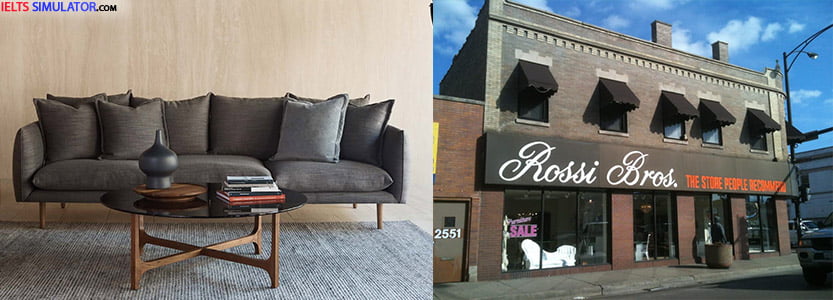IELTS LISTENING
HISTORY OF FURNITURE ROSSI
Tutor: Well James. I’ve had a Luca case study, and for a first draft, it looks promising.
James: I have to be honest. When you told us we had to write about a furniture company, it didn’t sound like the kind of thing that would interest me. But since then, I’ve changed my mind.
Tutor: Hmm, Why’s that?
James: Well, Q21 as you know, furniture, Rossi is an Australian company, still comparatively small compared to some of the High Street stores. But it’s got plans to expand into foreign markets, so I chose it for that reason. It’s going through a transition. It’s a family-run business aiming to build a global brand.
Attempt full Listening test…
Tutor: All right, and you’ve made that clear in your writing. That one thing, though, that I think you’ve overlooked is why Luca Rossi started a furniture company here in Australia in the first place.
James: Well, he just got an arts degree, hadn’t he? And people were trying to talk him into an academic profession, but he wanted a practical job, something he thought would be more satisfying in the long run. Q22 His grandfather had been a craftsman. He had made furniture in Italy, and he’d passed this skill onto Luca’s father and well Lucas thought he’d like to continue the tradition.
Tutor: Yes, that was the motivation behind his decision. And what was it? Do you think that guy furniture Rossi a competitive edge over other furniture companies?
James: I wouldn’t think it was price. It’s always been at the higher end of the market. But according to my research, Q23 it was to do with the attitude of the employees. They were really focused on giving good customer service.
Tutor: Yes, Luca Rossi insisted on that. Their promotional campaigns also emphasized the fact that the would only came from Australian forests, but that was the case with their rivals, too, so it wouldn’t have made them stand out. Okay, we’ll have a careful look at the content of your case study in a minute. But I just want to make a general comment first before you start writing your second draft.
James: Okay.
Tutor: Yes, Q24 what I like to see more off is your opinion a bit more critical thinking rather than the bare facts, but it’s good to see you’ve been careful with your referencing this time.
James: Thanks, and I read and reread my work, so I’m pretty sure there aren’t any errors with the language.
Tutor: Yes, it’s fine, but there’s one other thing I could probably mention at this point. Yes, well, at the end of term, you’ll also be giving a presentation also on furniture Rossi.
James: Yes, I haven’t given it much thought yet,
Tutor: Understandably but while you’re writing the case study, I’d recommend you think about what kind of information would be suitable to use in your presentation. Remember the last time you gave a presentation on a company you Q25 spent a considerable part of the time providing the audience with financial data, but I probably needed to him or about company’s strategy.
James: Yes, I did concentrate rather too much on the figures. I’ll make sure there’s a balance this time.
Tutor: Good. Okay, so let’s just think about the content of your case study the history of furniture Rossi. I see here in paragraph four, you’re talking about how Luca Rossi raised the capital for his new business venture. And then you’re talking about the customer base growing much wider. But what was it that prompted this growth? Well,
James: That was to do with the Q26 quality of the furniture products that the company was selling. People love that it was all handmade on would last.
Tutor: And because demand from customers kept growing.
James: Well, then Rossi needed to take on more craftsman so they could make sure the orders were ready on time. And then he also had to set up two Q27 new warehouses to make distribution quicker.
Tutor: Yes, and from there the company really grew. But I think what happened next? They started looking at wise to increase their profits and called in a consultant. And what he saw immediately was that the infrastructure was completely outdated. They were paying three full-time admin staff just for data entry. So, he recommended they upgrade their Q28 software programs and that in turn card operational costs and just speeded everything up.
James: I’m surprised they didn’t get onto that earlier, but I suppose Luca Rossi was more interested in the design aspect rather than the finance side of things.
Tutor: Yes, I imagine that’s why he eventually turned the day-to-day running of the company over to his son. And in fact, it was the son Marco who persuaded his father to move on from traditional television advertising and go online instead.
James: I guess that’s the best way to reach people.
Tutor: It can be but initially customers actually complained.
James: Why?
Tutor: Well, some users found it hard and navigate their way around the Q29 website, so they were getting frustrated and giving up. So then the company called in a professional to improve it.
James: Oh, I see. He must have done a good job. They’ve had a continuous three-year rise in revenue, so things must be going well,
Tutor: Indeed and what of the future?
James: Well, I probably need to talk about this a bit more in the concluding paragraphs, don’t I? Consumers are already aware of the quality of the furniture, that’s for sure. But I think the company is aiming to publicize their Q30 values. The fact that they have respect for beauty, durability, and functionality on the environment. Lots of companies are already…
